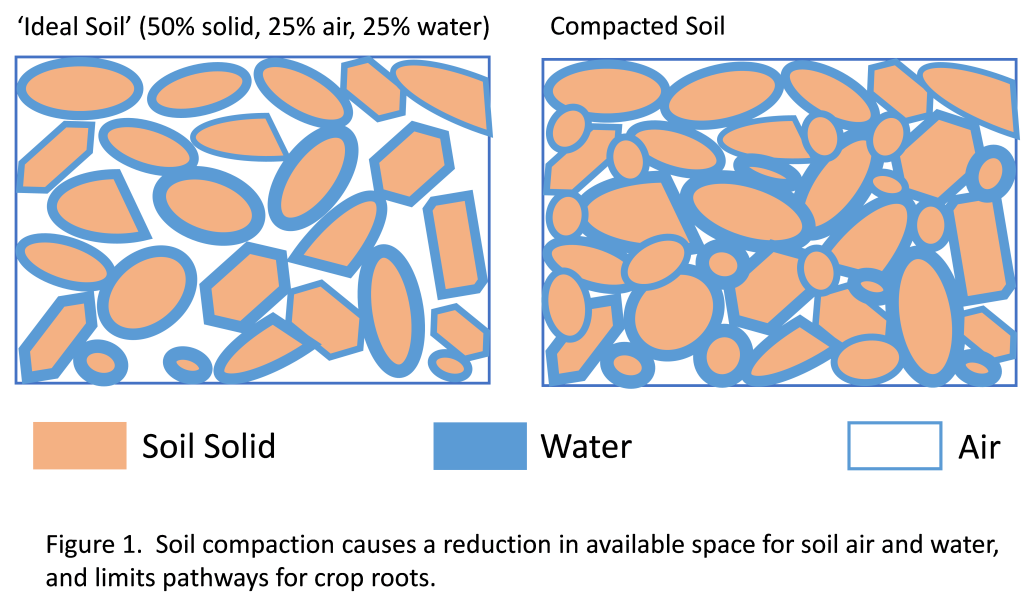by Dr. Jake Mowrer, Soil Nutrient and Water Resource Management Extension Specialist, Texas A&M Agrilife Extension; Dr. Dennis Coker, Extension Program Specialist II – Soil Fertility, Texas A&M Agrilife Extension
We are approaching that time of the year when Texas row crop producers are preparing for Winter wheat planting or nutrient applications for next year’s cotton, corn, and sorghum. Producers will have a need to travel through their fields several times during the next few months. We are likely to experience a few substantial rainfall events over this same period. Therefore, a timely reminder of the need to avoid excessive field traffic under wet soil conditions may be in order.
Soil compaction happens when the volume of tiny spaces between soil particles is reduced by applied pressure at the surface. When this occurs, soil becomes denser and will hold less air and/or water per unit volume (Fig. 1). When dry, soils resist compaction. However, as they take on more water, soils become more easily compressed. This is why it is important to avoid field travel with heavy equipment if at all possible when soils are near field capacity or greater water content. It may not be convenient, but sometimes it pays off to wait a few days for better conditions rather than risk the undesirable impacts compaction can have on production.
 Estimates of yield loss due to soil compaction range from 5% to 50%. The increase in strength required for roots to penetrate compacted layers reduces root proliferation and thus, the soil volume they can explore. This limits the amount of water and nutrients that a plant can take up. This past year, Texas producers experienced extremes in rainfall patterns. Too much in the spring, followed by too little in summer. Managing traffic to reduce compacting forces has the benefit of allowing more water to infiltrate the soil during periods of light to heavy rain, while allowing roots to access water at greater depths during times of drought.
Estimates of yield loss due to soil compaction range from 5% to 50%. The increase in strength required for roots to penetrate compacted layers reduces root proliferation and thus, the soil volume they can explore. This limits the amount of water and nutrients that a plant can take up. This past year, Texas producers experienced extremes in rainfall patterns. Too much in the spring, followed by too little in summer. Managing traffic to reduce compacting forces has the benefit of allowing more water to infiltrate the soil during periods of light to heavy rain, while allowing roots to access water at greater depths during times of drought.
In 2010, Dr. Dennis Coker and Dennis Pietsch diagnosed a nitrogen deficiency in corn directly related to soil compaction from field traffic in wet conditions. What they observed was a pattern of yellowed, shorter plants with lower leaf ‘firing’ occurring in certain rows across an entire field. Tissue analysis revealed a lower nitrogen content in leaves from the affected plants than in the plants in unaffected rows. The pattern was directly traceable to implement traffic through the field during a wet planting season.
Mother Nature doesn’t always allow us to plant and till at the ideal times. But a mindfulness of the potential for compaction in wet soils can preserve the productivity of Texas soils over the long-term.
For additional details on Dr. Coker’s work on soil compaction in corn production, please refer to Texas A&M AgriLife Extension publication “2010 Corn Performance Tests in Texas”. http://publications.tamu.edu/CORN_SORGHUM/PUB_2010%20Corn%20Performance%20Tests%20in%20Texas.pdf

Jake Mowrer Assistant Professor Dept. of Soil & Crop Sciences College Station, Tx. 77843-2474 979-845-5366 jake.mowrer@tamu.edu